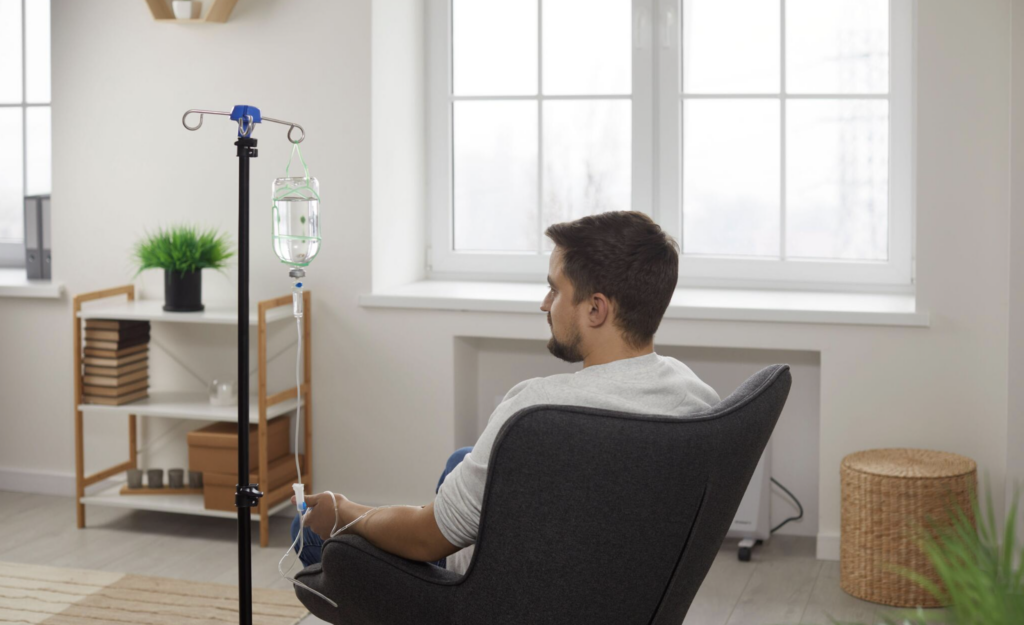Immunotherapy treatments for advanced skin cancer may be infused intravenously in a doctor’s office or infusion clinic. Other treatments may be taken orally or by injection. [Photo credit: ROMAN LACHEEV / ALAMY STOCK PHOTO]
Our expert, New York City medical oncologist Anna C. Pavlick, DO, shares her top insights from 25 years of experience treating patients with advanced skin cancers.
Thanks to the success of prevention and early detection campaigns (like The Skin Cancer Foundation’s Big See program), most skin cancers today are diagnosed and treated in the early stage. Still, any type of skin cancer, whether common or rare, can grow, spread and become dangerous or even life-threatening.
About 8,000 people in the U.S. die from advanced melanoma each year, and about 65 percent of those are men. The far more common types of skin cancer (basal cell carcinoma, or BCC, and squamous cell carcinoma, or SCC) also affect men more than women. These types have lower mortality rates, but because of their high prevalence, thousands may die from them. New York City medical oncologist Anna C. Pavlick, DO, has been overseeing the care of patients with advanced skin cancer for more than 25 years. She cares deeply about patient education and encourages everyone to take a skin cancer diagnosis seriously. Here, in her own words, she shares what she wants everyone to know.
1. If you are diagnosed with advanced skin cancer, this is the best time in history for that to happen to you.
When I started in this field, we had almost no treatment for any type of advanced skin cancer. It was dismal. We gave patients chemotherapy, which was not that helpful — and many died. But now, for the past 12 or 13 years, we have had an explosion of scientific breakthroughs and FDA approvals of systemic medicines. Targeted therapies and immunotherapies have changed the outcome for patients dramatically. These medications not only have slowed advanced disease but, in some cases, have cured it. This recent period of new treatments has been life changing. No physician likes to tell a patient they have advanced cancer, but it is comforting to know that yes, now we do have therapies and yes, they are highly effective.
2. It is crucial to take any suspicion or diagnosis of advanced cancer seriously and ask this important question.
If I had a dime for every person who I’ve heard say, “But it was just a skin cancer,” I could retire in style! If you are diagnosed with any form of skin cancer that becomes advanced, whether it’s a BCC, SCC, melanoma or Merkel cell carcinoma, you should always ask your dermatologist, “Do you think I need to see a medical oncologist?” If it’s melanoma, for example, you probably don’t need to see an oncologist if you are diagnosed as stage I. But if you’ve got a stage II or greater tumor, you should at least have a conversation with your dermatologist about consulting with a medical oncologist to discuss the risks and potential benefits of systemic treatment.
3. The oncologist is the driver of a multidisciplinary team.
With advanced cancers, I tell people that I’m driving the car. Let’s say I have a very big SUV with lots of seats for dermatologists, surgical oncologists, radiation oncologists, pathologists — they all get to ride in the car, but I’m doing the driving. Patients need to know, “Who’s my go-to? If something happens, who do I call?” Patients can always start with the medical oncologist. If it is not something that I can help you with, I’ll be able to direct you. Or I can ask you to come into the office where I can assess it, and then let’s go from there depending on what we find. You may need to go to a surgeon, you might need to get some new imaging, we may need to do a biopsy. Patients need one good contact person, and if we communicate and collaborate well, things will go smoothly and the patient will know where to go when, and what the next steps are.
4. If you want to get a second opinion, you should.
If patients ask about a second opinion, I tell them they should do what they’re comfortable with. Some people feel like they’ve already done their homework and just want to come in and get started. Others may feel like they need more information and options. If you or your family members want to get a second opinion, oncologists understand and are fine with that — and will even help you get a second opinion. Please make sure you get it from somebody reputable. Beyond that, you need to feel comfortable with your doctor and how they communicate.
5. Bring someone with you to your appointments, if possible.
I always recommend that patients bring someone with them to their appointments to help them hear and understand what is said, and even take notes. It is very hard to absorb everything when newly diagnosed. If a patient can’t bring somebody, it also works to have a loved one on the phone (put it on speaker) to listen in. Sometimes people can’t leave work, get childcare or even leave their home, but they can listen. And that can mean so much to a patient.
6. Yes, treatment is urgent for any advanced skin cancer, but …
I often say that “cancer doesn’t wait for anybody.” There is always a sense of urgency; the sooner that we address the issue, the better. Yes, there can be side effects from advanced skin cancer treatments (and those should be reported right away to your oncologist). But for many patients, the side effects are not terrible, so it shouldn’t affect planning too much. Say a patient has their daughter’s wedding three months from now. I’m going to say, “That gives us three months to get you feeling better. So why don’t we start, and we can always take a break around the wedding.” We can work around things that are important in people’s lives. It shouldn’t be all about cancer. You’re taking this treatment to improve the quality of your life so you can enjoy it.
7. It’s important to discuss, monitor and treat side effects.
When we talk about immunotherapy, I’m going to hand you information about the medicine I’m giving you, and you’re going to read things in the brochure that are going to scare you. We must do it because it’s a legal document. But then, we talk realistically about the things that are most likely to happen: Itching and rash, for example, are common and can be a sign that your immune system is doing its job to fight the cancer. These drugs are metabolized by your liver and your kidneys, so we check your liver and your kidneys often. We talk about diarrhea, and pneumonitis (inflammation of the lungs) — these are side effects that we are very familiar with managing quickly to resolve the problem. We know how to treat them, and they go away. There are also side effects that we would have to fix with medicine, sometimes for life (such as thyroid replacement), because the immune system tends to attack the organs that produce hormones. We weigh all of this information before determining the course of your treatment.
8. Ask about financial help to pay for your medicine.
Don’t be afraid to talk about finances; it’s just as important as reporting side effects to your oncologist. Many of the therapies we give are covered. If you are a Medicare patient, Medicare pays the 80 percent, and your secondary plan picks up the 20 percent. But some treatments may not be covered, and you may get socked with a large copay. Don’t just accept that. Many of the drug companies offer patient support. There are assistance programs that have grant funding for patients, and it may greatly reduce the cost. But you should make the effort and ask your doctors and advocate for yourself. Also ask if there is a specialty pharmacy in your area that may have a negotiated discounted rate or grant program.
9. If your medicine didn’t help you, it’s not your fault, and there may be other things to try.
I tell the patient that the treatment failed. The patient didn’t fail; they did everything they were supposed to do. It was their tumor that did not respond. It’s not God punishing you. It’s cancer, and it sucks. I try to frame it that our therapies are very effective, but you need to understand that they are not 100 percent effective. We don’t know whose tumor is going to respond and whose tumor is not going to respond until we treat it. If your tumor is responding, we’re going to keep going. But if your tumor is not responding, we have other options that we’re going to go to next.
Don’t be afraid to talk about finances. It’s just as important as reporting side effects to your oncologist. There are patient assistance programs for funding. Advocate for yourself.
10. Research continues.
The great news is that the boom in breakthroughs for advanced cancers is not over. More research and promising treatments are in the pipeline. Also, as we get better agents, we may be able to push the envelope and treat even earlier tumors with new methods.
For example, I had my eye on the progress of tumor infiltrating lymphocyte (TIL) therapy. TILs are naturally occurring immune cells that can recognize unique tumor markers on cancer cells in the body and attack and kill them. In February of 2024, the FDA approved Lifileucel (Amtagvi), a cellular therapy designed to enhance the patient’s own TILs outside the body and then deliver them back to the patient to attack the cancer cells.
Other research is happening all the time, including progress on vaccines that could help prevent recurrence of advanced skin cancer. As we continue to move science toward even better options with less toxicity, we are going to push our patient successes higher and never stop until no one dies from advanced skin cancer ever again.
Anna C. Pavlick, DO, MBA, is a medical oncologist and professor of medicine in the Division of Hematology & Medical Oncology at Weill Cornell Medicine in New York City. She is the founding director of the Cutaneous Oncology Program at Weill Cornell Medicine and New York-Presbyterian. Dr. Pavlick’s major research interests include investigating targeted therapies, combination therapies and immunotherapies.





